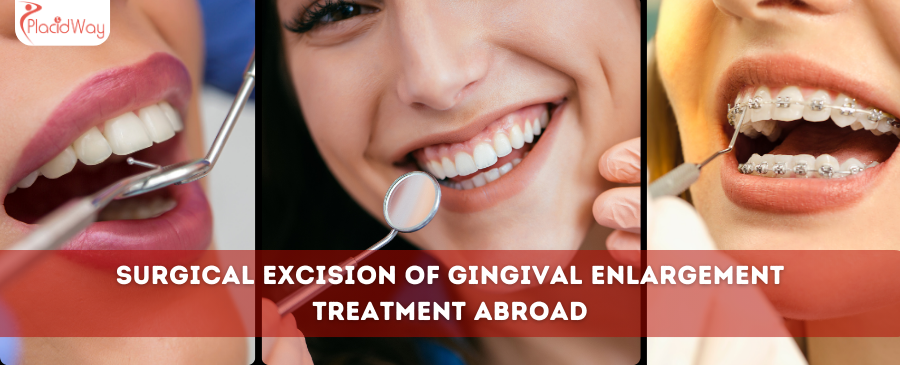
Rediscover Your Confident Smile: Surgical Excision of Gingival Enlargement Abroad
Are you struggling with gums that appear swollen, overgrown, or seem to be covering too much of your teeth? This condition, known as gingival enlargement or gingival hypertrophy, isn't just an aesthetic concern; it can significantly impact your oral health, making it difficult to clean your teeth effectively and potentially leading to further complications. If you're searching for a definitive solution, surgical excision of gingival enlargement offers a highly effective way to restore your gums to a healthy, natural contour.
Imagine being able to smile freely, speak clearly, and maintain optimal oral hygiene without the daily struggle of overgrown gums. For many, this dream becomes a reality through advanced dental procedures. While the idea of "gum surgery" might sound daunting, modern techniques, often involving lasers or precise scalpel work, make it a safe and routine procedure designed for your comfort and lasting results.
More and more individuals are also discovering the exceptional value and quality of care available through dental tourism. Traveling abroad for surgical excision of gingival enlargement can provide access to world-class specialists, state-of-the-art facilities, and significant cost savings, all while offering the opportunity to experience a new culture. This guide will walk you through everything you need to know about this procedure, from understanding your symptoms and causes to navigating treatment options and planning your journey for a healthier, more beautiful smile.
What are the signs and symptoms of overgrown gums?
Recognizing the signs of gingival enlargement is the first step towards seeking treatment. It's not always just a minor cosmetic issue; it can signal underlying health problems and contribute to other dental concerns. Here are the common symptoms patients experience:
- Visibly Enlarged Gums: The most obvious sign is that your gums appear larger, thicker, or "puffier" than usual. They might even seem to be growing over parts of your teeth.
- Redness and Inflammation: Healthy gums are typically pink. Overgrown gums often look red, swollen, and inflamed.
- Bleeding Gums: Even with gentle brushing or flossing, you might notice your gums bleeding easily. This is a common indicator of inflammation.
- Tenderness or Pain: While not always painful, enlarged gums can be tender to the touch or cause discomfort, especially during eating or brushing.
- Difficulty with Oral Hygiene: The excess tissue can create "pockets" where food particles and bacteria accumulate, making effective brushing and flossing challenging. This further exacerbates inflammation and can lead to bad breath or gum infections.
- Changes in Tooth Appearance: Teeth might appear shorter or partially covered by the overgrown gum tissue, affecting your smile's aesthetics.
- Chewing or Speaking Difficulties: In severe cases, the bulk of the gum tissue can interfere with chewing food properly or articulating words clearly.
If you notice any of these symptoms, it's crucial to consult a dental professional. Early diagnosis and treatment can prevent further complications and improve your overall oral health.
Why do my gums grow too much, and what causes gingival enlargement?
Understanding the root cause of your gum overgrowth is vital for effective treatment and prevention. It's not just a random occurrence; there's often an identifiable reason behind it. The primary causes include:
- Drug-Induced Gingival Enlargement (DIGE): This is one of the most common causes. Several types of medications can cause gums to overgrow as a side effect:
- Anticonvulsants: Especially Phenytoin (Dilantin), used to treat epilepsy.
- Immunosuppressants: Cyclosporine, often prescribed after organ transplantation.
- Calcium Channel Blockers: Nifedipine, Verapamil, Diltiazem, Amlodipine, used for high blood pressure and heart conditions.
- Inflammation and Poor Oral Hygiene: When plaque and tartar accumulate on teeth due to inadequate brushing and flossing, it irritates the gums, leading to inflammation (gingivitis). Chronic inflammation can cause the gum tissue to swell and enlarge. This is often reversible with improved hygiene.
- Systemic Diseases: Certain health conditions can manifest as gum enlargement:
- Leukemia (a type of blood cancer)
- Crohn's disease
- Diabetes
- Hormonal Changes: Fluctuations during puberty, pregnancy, or menstruation can sometimes lead to temporary gum enlargement, often exacerbated by existing inflammation.
- Genetic Predisposition: Some individuals are simply more prone to gingival enlargement due to inherited traits. This is known as hereditary gingival fibromatosis.
- Nutritional Deficiencies: Severe vitamin C deficiency (scurvy) can cause swollen, bleeding gums.
A thorough dental and medical history review by a dentist is essential to pinpoint the specific cause of your gingival enlargement and determine the most appropriate course of action.
What are the different ways to treat overgrown gums?
The approach to treating overgrown gums depends heavily on the underlying cause and the severity of the condition. Treatment can range from non-surgical interventions to definitive surgical procedures:
Non-Surgical Treatments:
- Improved Oral Hygiene: For inflammation-induced enlargement, professional dental cleaning (scaling and root planing) combined with diligent home care (brushing twice daily, flossing, antiseptic mouthwash) can often reduce swelling and return gums to a healthier state.
- Medication Adjustment: If drug-induced gingival enlargement is diagnosed, your doctor might collaborate with your dentist to adjust your medication dosage or switch to an alternative drug, if medically appropriate. *Never stop or change medication without consulting your physician.*
Surgical Treatments (Surgical Excision of Gingival Enlargement):
When non-surgical methods are insufficient, or the enlargement is severe and persistent, surgical removal of the excess gum tissue is the most effective solution. This category includes:
- Gingivectomy: This is the most common surgical procedure for removing overgrown gum tissue. It involves carefully excising the excess gum tissue to restore a proper gum line and make it easier to clean the teeth. It can be performed using:
- Traditional Scalpel: A precise surgical blade is used to remove the tissue.
- Electrosurgery: Uses a high-frequency electrical current to cut and coagulate tissue, which can reduce bleeding.
- Laser Gingivectomy (Laser Gum Contouring): A dental laser is used to vaporize the excess tissue. This method often results in less bleeding, minimal swelling, and faster healing compared to traditional methods, as the laser also sterilizes and seals blood vessels. It's often preferred for its precision and patient comfort.
- Gingivoplasty: Often performed in conjunction with a gingivectomy, gingivoplasty reshapes the gum tissue to create a more aesthetically pleasing contour and natural-looking gum line.
- Flap Surgery: In very severe cases or when bone reshaping is also needed, the gum tissue might be lifted (a "flap") to allow access for tissue and bone removal, then repositioned.
Your dentist will assess your specific condition, discuss the causes, and recommend the most suitable surgical technique to achieve optimal health and aesthetic results.
Am I a candidate for surgical gum enlargement removal?
Deciding whether surgical excision of gingival enlargement is right for you involves a thorough evaluation by a dental professional. Here's a general guide to eligibility:
You are likely a good candidate if:
- Non-Surgical Treatments Failed: You've tried improving oral hygiene or adjusting medication (if applicable) without significant improvement in gum overgrowth.
- Significant Gum Overgrowth: Your gums are severely enlarged, making it difficult to brush and floss effectively, leading to plaque buildup, inflammation, or recurrent infections.
- Aesthetic Concerns: The overgrown gums significantly impact the appearance of your smile, making teeth look short or disproportionate, and causing self-consciousness.
- Good General Health: You are in good overall health, without any uncontrolled systemic diseases that could complicate surgery or healing (e.g., uncontrolled diabetes, severe bleeding disorders).
- Commitment to Oral Hygiene: You are willing to maintain excellent oral hygiene post-procedure to prevent recurrence and ensure long-term success.
- No Active Oral Infections: Any active gum disease or other oral infections should be treated before surgical excision.
Considerations that might affect candidacy:
- Underlying Medical Conditions: Certain conditions, especially those affecting healing or blood clotting, might require careful management or delay the procedure.
- Smoking: Smoking can impair healing and increase the risk of complications. Your dentist may advise you to quit or reduce smoking before surgery.
- Medications: Your dentist will review all your medications, especially blood thinners, to ensure a safe procedure.
Ultimately, a consultation with a periodontist (a gum specialist) or an experienced general dentist will determine your specific eligibility and recommend the best treatment plan tailored to your needs.
What is the recovery like after gum enlargement surgery?
Recovery is a crucial phase after any surgical procedure. For surgical excision of gingival enlargement, most patients find the recovery manageable, with healing typically progressing smoothly within a few weeks. Here's what you can generally expect:
- Immediate Post-Procedure:
- Discomfort: You may experience mild to moderate discomfort or soreness. This is usually managed effectively with over-the-counter pain relievers (like ibuprofen or acetaminophen) or, if necessary, a prescription pain medication.
- Swelling and Bruising: Some minor swelling and bruising are normal but usually minimal, especially with laser techniques.
- Bleeding: Slight oozing or bleeding can occur for the first 24 hours. Your dentist may place a periodontal dressing (a protective bandage) over the treated area.
- First Few Days (Day 1-3):
- Diet: Stick to a soft diet, avoiding hot, spicy, crunchy, or sticky foods that could irritate the healing gums.
- Oral Hygiene: Your dentist will provide specific instructions. Generally, you'll be advised to brush very gently around the surgical site, or perhaps just rinse with an antiseptic mouthwash (e.g., chlorhexidine) to keep the area clean. Avoid vigorous rinsing or spitting.
- Activity: Avoid strenuous physical activity for the first few days to prevent increased bleeding or swelling.
- First Week (Day 4-7):
- Discomfort should significantly subside.
- The periodontal dressing (if used) might be removed, or it may naturally fall off.
- You can gradually reintroduce more solid foods as comfort allows.
- Full Healing (2-4 Weeks):
- The gum tissue will continue to heal and remodel.
- You'll typically have a follow-up appointment to check healing progress.
- Maintaining excellent oral hygiene becomes critical to prevent recurrence and ensure long-term health.
Adhering to your dentist's post-operative instructions is paramount for a smooth recovery and successful outcome. Most patients are back to their normal routines within a week, with gums looking much healthier.
Are there any risks or side effects of removing overgrown gums?
Like any surgical procedure, surgical excision of gingival enlargement carries some potential risks and side effects, though serious complications are rare. Your dental team will discuss these with you during your consultation to ensure you are fully informed. Common potential issues include:
- Pain and Discomfort: As mentioned, some pain and soreness are expected immediately after the procedure, typically manageable with medication.
- Swelling and Bruising: Mild to moderate swelling and bruising around the treated area are normal and usually subside within a few days.
- Bleeding: Some light bleeding or oozing from the surgical site is common for the first 24 hours. Prolonged or heavy bleeding is rare but should be reported to your dentist.
- Infection: Any surgical site carries a risk of infection. Your dentist may prescribe antibiotics to prevent this, especially if you have certain medical conditions. Adhering to post-operative hygiene instructions is crucial.
- Gum Sensitivity: The treated gums, or exposed tooth roots, may be temporarily sensitive to hot, cold, or sweet foods and drinks after the procedure. This usually diminishes over time. Special toothpastes for sensitive teeth can help.
- Root Exposure: In some cases, removing significant amounts of gum tissue can expose a small portion of the tooth root, which can lead to increased sensitivity.
- Recurrence: If the underlying cause of the gingival enlargement (e.g., specific medication, poor oral hygiene) is not adequately addressed, there is a risk that the gum tissue may grow back over time.
- Changes in Appearance: While the goal is improved aesthetics, it's essential to have realistic expectations. Discuss the anticipated cosmetic outcome with your dentist.
- Numbness: Very rarely, temporary or permanent numbness in the treated area can occur if a nerve is affected during surgery.
Choosing an experienced periodontist or oral surgeon significantly minimizes these risks. They will take all necessary precautions and provide comprehensive post-operative care instructions to ensure a safe procedure and successful recovery.
How much does gingival enlargement surgery cost worldwide?
The cost of surgical excision of gingival enlargement can vary significantly depending on several factors, including the country, the clinic's reputation, the dentist's experience, the technique used (scalpel, laser, electrosurgery), the extent of the enlargement (e.g., one quadrant vs. full mouth), and whether any additional procedures are needed. Here's a general cost comparison to give you an idea:
Estimated Cost Comparison Table (Surgical Excision of Gingival Enlargement)
| Region/Country | Estimated Cost (Per Quadrant)* | Estimated Cost (Full Mouth)* | Key Advantages for Medical Tourists |
|---|---|---|---|
| USA / Canada | $1,000 - $2,500+ | $3,000 - $10,000+ | High standards, advanced tech (but high cost). |
| UK / Western Europe | €800 - €2,000+ | €2,500 - €8,000+ | High standards, similar to North America (also high cost). |
| Mexico | $200 - $600 | $500 - $2,000 | Proximity to USA, significantly lower costs, reputable clinics. |
| Turkey | €150 - €500 | €400 - €1,800 | Excellent value, modern facilities, experienced dentists, attractive tourist destination. |
| Thailand | $180 - $550 | $450 - $1,900 | High-quality care, world-renowned hospitality, exotic travel experience. |
| Colombia | $150 - $450 | $350 - $1,500 | Emerging dental tourism, high-quality care, lower costs, beautiful country. |
*Prices are estimates and can vary based on the clinic, specific procedure details (e.g., laser vs. scalpel), and additional services. Always request a personalized quote.
As you can see, the potential savings by choosing dental tourism destinations like Mexico, Turkey, Thailand, or Colombia are substantial, often ranging from 50% to 80% compared to Western countries. This makes high-quality dental care more accessible and affordable.
Why should I consider traveling abroad for gingival enlargement surgery?
The decision to seek medical treatment abroad, especially for dental procedures like surgical excision of gingival enlargement, is becoming increasingly popular. Here are compelling reasons why many patients choose this path:
- Significant Cost Savings: This is often the primary driver. As seen in the cost comparison, procedures can be dramatically more affordable in countries known for dental tourism, even when factoring in travel and accommodation expenses.
- Access to High-Quality Care and Expertise: Many international clinics boast state-of-the-art technology, internationally trained specialists (often with Western education), and adhere to rigorous international safety standards.
- Reduced Waiting Times: In some countries, getting an appointment for specialized dental procedures can involve long waits. Abroad, you can often schedule your treatment much sooner, allowing for quicker relief and recovery.
- Advanced Technology: Leading dental tourism destinations often invest heavily in the latest dental technology, including advanced laser systems for more precise and comfortable gum surgery.
- Privacy and Anonymity: Some patients prefer the discretion of receiving treatment away from their home country.
- Combined with a Vacation: The opportunity to recover in a beautiful, relaxing environment, or even combine your treatment with a vacation, adds significant appeal. Many clinics offer package deals that include airport transfers, accommodation, and even local tours.
- Personalized Attention: Clinics catering to international patients often provide highly personalized care, including dedicated patient coordinators and multi-lingual staff to ensure a smooth and comfortable experience.
Choosing to go abroad doesn't mean compromising on quality; it means expanding your options to find the best value and care for your specific needs.
Which countries are best for affordable gum overgrowth treatment?
When searching for affordable yet high-quality options for surgical excision of gingival enlargement, several countries consistently stand out as premier dental tourism destinations:
- Mexico:
- Why: Close proximity for North Americans, significantly lower costs, and numerous modern clinics, especially in border towns and popular tourist cities like Cancun.
- Ideal for: Patients from the USA and Canada seeking convenient and cost-effective treatment.
- Turkey:
- Why: Exceptional value, state-of-the-art facilities, highly skilled dentists, and a vibrant cultural experience. Istanbul, Antalya, and Izmir are popular hubs.
- Ideal for: European patients and those looking for a comprehensive medical tourism package.
- Thailand:
- Why: Renowned for medical tourism, offering world-class dental care, cutting-edge technology, and unparalleled hospitality at a fraction of Western prices. Bangkok and Phuket are prime locations.
- Ideal for: Patients from Asia, Australia, and those seeking a tropical getaway combined with treatment.
- Colombia:
- Why: An emerging destination known for skilled dentists, modern clinics, and competitive pricing, particularly in cities like Cartagena and Medellin.
- Ideal for: North and South American patients seeking excellent care in a beautiful, culturally rich country.
- Costa Rica:
- Why: A strong reputation for dental tourism, offering high standards of care, English-speaking staff, and the appeal of eco-tourism.
- Ideal for: Patients from North America combining dental work with a nature-focused vacation.
- Hungary:
- Why: A long-established dental tourism hub in Europe, known for highly trained dentists and affordable prices, especially in Budapest.
- Ideal for: European patients looking for budget-friendly options within the continent.
When selecting a country, consider not just the cost, but also travel logistics, language barriers, and the specific expertise of the clinics in the region for gum-related procedures.
What should I expect when planning international travel for gum surgery?
Traveling abroad for dental surgery requires careful planning to ensure a smooth and stress-free experience. Here's what you should anticipate:
- Research and Select a Clinic/Destination:
- Start by researching reputable clinics and specialists in your chosen country. Look for reviews, accreditations, and before-and-after photos.
- Consider using a medical tourism facilitator like PlacidWay, who can help you find vetted clinics, compare quotes, and streamline the process.
- Initial Consultation (Remote):
- Most clinics offer virtual consultations. You'll likely need to send recent dental X-rays, photos of your gums, and your medical history.
- Discuss your symptoms, expectations, and receive a preliminary treatment plan and cost estimate.
- Budgeting:
- Factor in the cost of the procedure, flights, accommodation, local transportation, meals, and potential travel insurance.
- Keep a contingency fund for unexpected expenses.
- Travel Documents and Logistics:
- Check passport validity and any visa requirements for your destination country.
- Book flights and accommodation. Many clinics offer assistance or have partnerships with hotels.
- Arrange airport transfers; some clinics include these in their packages.
- Pre-Operative Preparation:
- Follow any specific instructions from your dentist regarding diet, medications to avoid, or tests needed before arrival.
- Arrive a few days before your procedure to settle in, adjust to the time difference, and attend an in-person consultation.
- During and After Treatment:
- The procedure itself is typically quick.
- Plan for a recovery period of at least a few days (often 5-7 days) in the destination country to allow for initial healing and a follow-up check-up before flying home. Avoid flying immediately after surgery if possible.
- Follow all post-operative care instructions carefully.
- Communication:
- Ensure the clinic has English-speaking staff or that an interpreter will be available.
- Keep a list of emergency contacts, both local and international.
Proper planning ensures not only a successful treatment outcome but also a pleasant and memorable travel experience.
How can I ensure safe and quality care for gingival excision overseas?
Ensuring safety and quality is paramount when considering medical treatment abroad. While many international clinics offer excellent care, due diligence is key. Here’s how you can safeguard your experience:
- Choose Accredited Facilities: Look for clinics accredited by international bodies like Joint Commission International (JCI), or local governmental health organizations. This indicates adherence to strict quality and safety standards.
- Verify Dentist Credentials: Research the dentist's qualifications, specialization (periodontist), experience, and any international certifications. Don't hesitate to ask for their CV or portfolio.
- Read Patient Reviews and Testimonials: Look for independent reviews on platforms beyond the clinic’s own website. Medical tourism facilitators often provide verified patient testimonials.
- Ask for Transparent Pricing: Request a detailed, itemized quote that includes all aspects of the procedure, materials, consultations, and follow-up care to avoid hidden costs.
- Understand Communication Channels: Confirm that you can communicate effectively with the medical staff, either directly in English or through a professional interpreter.
- Inquire About Technology and Protocols: Ask about the equipment used (e.g., laser technology), sterilization protocols, and emergency procedures.
- Clarify Follow-up Care: Understand what kind of post-operative support is available once you return home and how to handle potential complications or questions remotely.
- Consider a Medical Tourism Facilitator: Companies like PlacidWay specialize in vetting clinics, coordinating travel, and providing support throughout your medical journey, acting as an extra layer of assurance.
- Trust Your Gut: If something feels off during your research or initial consultations, it’s always best to seek other options.
By taking these steps, you can significantly increase your chances of a safe, high-quality, and successful outcome for your gingival enlargement surgery abroad.
What are some patient success stories after gum enlargement surgery abroad?
Hearing about others' positive experiences can provide immense reassurance and inspiration. Many patients who choose to travel abroad for surgical excision of gingival enlargement share stories of life-changing transformations:
- "Sarah from the UK (Turkey):" Sarah had been self-conscious about her "gummy smile" and frequent gum inflammation for years, a side effect of medication. After researching, she chose a clinic in Istanbul. "The care was exceptional, the clinic felt more luxurious than anything I'd seen at home, and the laser gingivectomy was almost pain-free. My gums look perfect now, and I saved thousands. Plus, I got to explore a beautiful city!" She reported a rapid recovery and no recurrence after switching medication under her doctor's guidance.
- "Mark from Canada (Mexico):" Mark experienced significant gum overgrowth that made eating and brushing a daily struggle. His local dentist quoted a very high price. "I went to Tijuana for my gum removal surgery. The facility was clean, modern, and the periodontist was incredibly skilled. The whole process was smooth, and my recovery was quick. My gums are healthy, and my teeth look so much better. It was truly worth the trip for the savings and quality."
- "Elena from Australia (Thailand):" Elena had hereditary gingival fibromatosis that gradually worsened. She traveled to Bangkok for a comprehensive surgical excision. "I was nervous about going so far, but the clinic in Bangkok was amazing. They had patient coordinators who spoke perfect English and helped with everything. My surgery was successful, and my smile is completely transformed. I never thought I'd get such a natural-looking result, and the cost was unbelievably affordable."
These stories often emphasize not just the successful surgical outcome but also the positive overall experience: the professionalism of the medical staff, the modern facilities, the significant cost savings, and the added benefit of a memorable travel experience. These real-world examples underscore the growing trend of medical tourism providing accessible, high-quality solutions for conditions like gingival enlargement.
Take the Next Step with PlacidWay
Ready to explore treatment options abroad? Discover top clinics, compare prices, and get a free quote tailored to your needs with PlacidWay.
Dental Tourism | Cosmetic Dentistry | Implants | Root Canals | Dentures | Bridges | Orthodontics | Dental Holidays Abroad





.png)
.png)
.png)
.png)

Share this listing